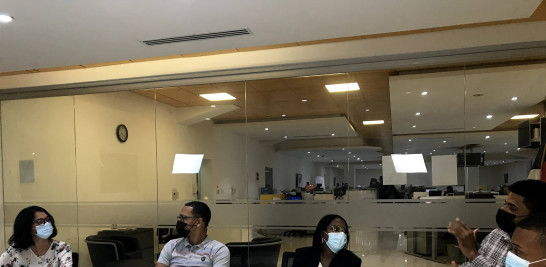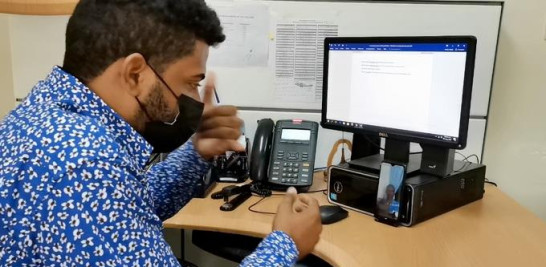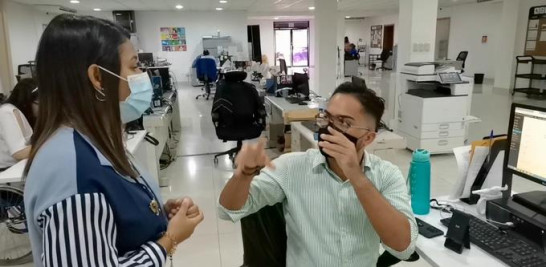Barriers of Silence
Barriers go beyond the lack of hearing in the workplace of deaf people

"Many companies don't want to employ us because they still believe we're stupids, that we have some intellectual disability, that we do not know how to do anything…; We have a lot of skills, we just need the opportunities." Explains in sign language Pablo Taveras, president of the National Association of the Deaf (Ansordo).
Article 62 of the Dominican Constitution declares work as "a right, a duty and a social function of all citizen", but the communicative barrier between deaf people and listeners is sometimes seen as limitation for people with hearing disabilities who want to collaborate in companies or public institutions.
The lawyer and executive director of Best Buddies RD, Maureen Tejeda Metz, believes that when we talk about labor inclusion "we are referring to a right of any human being, regardless of their condition, especially if they have a disability or not."
The most important barrier to the labor inclusion of this population is communication.
"Many companies have deaf people working, but they don't have an interpreter with them," that's one of the concerns that overwhelm José Osvaldo Hidalgo, a young man with hearing disabilities who has tried to get a job, but just gets informal jobs.
Pablo Taveras adds that from the job interview to the daily tasks, it is difficult to communicate with their bosses or colleagues.
The lack of interpreters, their high cost and the fact that deaf people have to pay for them, makes it even more difficult to be admitted to employment.
While it is true that written information can facilitate communication, reading skills of deaf people in general is very low because of the weaknesses of the educational system and also because Spanish is their second language, the first is sign language.
These young people had noticed a lack of awareness from their employers and co-workers.

"Many of them make fun of us, tell us ugly words, treat us badly," explains Pablo.
Another important barrier and little perceived by people without disabilities is the knowledge of roles and expectations in jobs.
In the case of the Santa Rosa Institute for the Deaf, in the area of inclusion and job training, in coordination with some companies and institutions, they carry out training projects for people with hearing disabilities.
Despite this, this community has a lack of knowledge or misinformation about the expectations of a work environment, in which they may not have colleagues who are proficient in their language: sign language.
"Listeners learn the expectations of work environments from an early age, listening to those in their family talk about that, but we do not have access to this information," adds Pablo.
Changes
The labor inclusion of people with disabilities is not a philanthropic or charitable activity and is much more than a social responsibility, it is even a legal commitment to the Dominican State, according to Tejeda Metz.
"When there is only one deaf person in a company, they feel isolated even if there is communication with the listeners," says Pablo.

So companies need to change their workforce, and sometimes even their infrastructure, to include people with disabilities.
Sandra Cuevas, director of the Santa Rosa Institute, recommends that companies know the laws on which the inclusion of people with disabilities is based and raise awareness about deaf people. Also, assign a budget for employees to learn sign language.
"We seek greater flexibility on the part of employers as well as opportunities when it comes to working, simply because we do not have communication we do not have a job, we only need an interpreter,"express José, unemployed.
Efforts
The case of Arabellys Montero, a graduate in Accounting who works in a financial institution, is the opposite. The 25-year-old is happy to work where she always dreamed. But above all, she is proud that the institution where she serves as a collaborator has arranged sign language courses for her peers.
"Communication is sometimes good, sometimes not so much, but they make the effort," Arabellys explains.
As in other spaces, the pandemic made it difficult for deaf people to develop their work.
"When the use of masks was implemented it was very difficult to communicate, we could not read people's lips,” says Adriel in a somewhat elevated tone, thanks to therapy he can use his voice to speak even if he does not listen fully.

He couldn't even communicate in writing because the fear of contagion made people unwilling to touch or see the papers. Even sign communication was complicated, because it was difficult to understand and maintain communication at a distance.
For Arabellys Montero it has also been difficult. Some listeners talk to her and she has to explain to them she is deaf.
"A deaf person can't understand the other person they're talking to with the mask, they have to rely on the text, on mimicry, on text message," he says.





